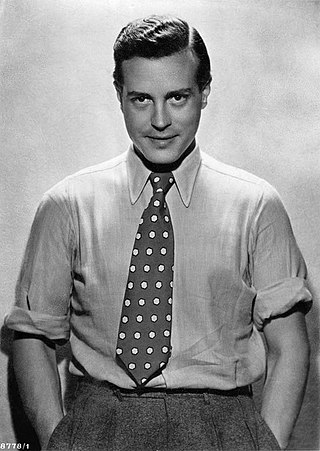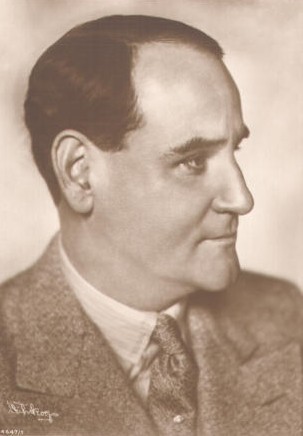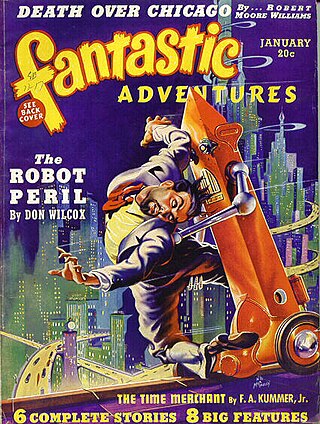
A robot is a machine—especially one programmable by a computer—capable of carrying out a complex series of actions automatically. A robot can be guided by an external control device, or the control may be embedded within. Robots may be constructed to evoke human form, but most robots are task-performing machines, designed with an emphasis on stark functionality, rather than expressive aesthetics.

Walter Adolph Georg Gropius was a German-American architect and founder of the Bauhaus School, who, along with Alvar Aalto, Ludwig Mies van der Rohe, Le Corbusier and Frank Lloyd Wright, is widely regarded as one of the pioneering masters of modernist architecture. He was a founder of Bauhaus in Weimar (1919). Gropius was also a leading architect of the International Style.

Curd Gustav Andreas Gottlieb Franz Jürgens was a German-Austrian stage and film actor. He was usually billed in English-speaking films as Curt Jurgens. He was well known for playing Ernst Udet in Des Teufels General. His English-language roles include James Bond villain Karl Stromberg in The Spy Who Loved Me (1977), Éric Carradine in And God Created Woman (1956), and Professor Immanuel Rath in The Blue Angel (1959).

DEFA was the state-owned film studio of the German Democratic Republic throughout the country's existence.

Android Kikaider is a tokusatsu television series based on the superhero manga Kikaider by Shotaro Ishinomori. The show was produced by Toei Company and Ishimori Productions, and was broadcast in Japan on NET from July 8, 1972, to May 5, 1973, with a total of 43 episodes.

Metropolis is a 2001 Japanese animated futurist cyberpunk drama film loosely based upon Osamu Tezuka's 1949 manga of the same name. The film was directed by Rintaro, written by Katsuhiro Otomo, and produced by Madhouse, with conceptual support from Tezuka Productions.

Algol: Tragedy of Power is a 1920 German science fiction film about an alien from the planet Algol.

Theodor Oberländer was an Ostforschung scientist and German Nazi official and politician, who after the Second World War served as Federal Minister for Displaced Persons, Refugees and Victims of War in West Germany from 1953 to 1960, and as a Member of the Bundestag from 1953 to 1961 and from 1963 to 1965.

The Tunnel, also known as Transatlantic Tunnel in the United States, is a 1935 British science fiction film directed by Maurice Elvey and stars Richard Dix, Leslie Banks, Madge Evans, Helen Vinson, C. Aubrey Smith and Basil Sydney. It is based on the 1913 novel Der Tunnel by Bernhard Kellermann, about the building of a transatlantic tunnel between New York and London. The script was written by Curt Siodmak, L. du Garde Peach and Clemence Dane. The film, produced at a time when the threat of war loomed in Europe, emphasized international cooperation between the United States and the United Kingdom.

Wolf Albach-Retty was an Austrian actor. He was the father of Romy Schneider with the German actress Magda Schneider.

Rudolf-Harbig-Stadion is a football stadium in Dresden, Saxony. It is named after German athlete Rudolf Harbig, and is the current home of Dynamo Dresden. Sports facilities have existed on the site of the stadium, the Güntzwiesen, since 1874. On 10 September 1911 the stadium hosted an international friendly match between Germany and Austria, which ended in a 1:2 defeat of host team Germany. The stadium also hosts events other than football games and has hosted several home games of the Dresden Monarchs American Football team of the German Football League, including their lone home appearance in the BIG6 European Football League in 2014.

Robopocalypse (2011) is a science fiction novel by Daniel H. Wilson. The book portrays AI out of control when a researcher in robotics explores the capacity of robots. It is written in present tense. Writer Robert Crais and Booklist have compared the novel to the works of Michael Crichton and Robert A. Heinlein. It was a bestseller on the New York Times list.
The Inland Fisher Guide Plant was a General Motors facility located in the West Trenton section of Ewing Township, New Jersey, that opened in 1938 as one of its most modern plants and was operated by the firm for 60 years. The facility was initially part of the Ternstedt division of GM's Fisher Body unit and was used to construct auto parts such as body moldings, door handles and other interior components. During World War II, the facility was converted to build torpedo bombers for the United States Navy as part of GM's Eastern Aircraft.

Eduard Clemens Franz Anna Freiherr von Wangenheim, known as Eduard von Winterstein, was an Austrian-German film actor who appeared in over one hundred fifty German films during the silent and sound eras. He was also a noted theater actor.

Hans Adalbert Schlettow was a German film actor. Schlettow appeared in around a hundred and sixty films during his career, the majority during the silent era. Among his best-known film roles was Hagen von Tronje in Fritz Lang's film classic Die Nibelungen (1924). In 1929 he starred in the British director Anthony Asquith's film A Cottage on Dartmoor.

Edith Baumann was a German politician. She was a co-founder and official of the Free German Youth, the youth organisation that after 1946 became the youth wing of East Germany's ruling Socialist Unity Party . Between 1946 and her death she was a member of the country's powerful Party Central Committee.

AI takeover—the idea that some kind of artificial intelligence may supplant humankind as the dominant intelligent species on the planet—is a common theme in science fiction. Famous cultural touchstones include Terminator and The Matrix.
















